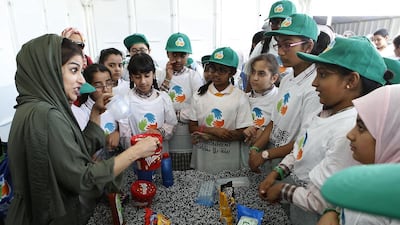The organisers of a beach clean-up estimated that six tonnes of waste were collected from just one Abu Dhabi beach in a day, as they warned of a poor attitude to littering.
Plastics manufacturer Borouge organised the clean-up, with about 3,500 volunteers, at Kitesurfing beach on Saadiyat Island on Sunday.
As one of the world’s biggest generators of waste, Abu Dhabi has a major challenge with pollution. On average, residents of the capital generate 1.65 kilograms of solid waste a day.
According to the Gulf Petrochemicals and Chemicals Association, plastic makes up about a third of the 80 million tonnes of waste generated in the Gulf every year.
Schools, volunteers and businesses took part in Sunday’s clean-up, organised by Borouge.
Despite being one of the world’s biggest producers of petrochemicals, Borouge organises clean-up campaigns in all the cities where it operates, including Mumbai, Shanghai and Singapore.
Company representatives said they were aware plastics accounted for the majority of the litter found in cities and was determined to do its bit in addressing the issue.
They said not enough was being done about a problem that communities could manage, and that starting education on recycling and littering at a young age was an important part of the solution.
“It’s very easy to put the blame on plastic production, it’s very easy to say ‘plastic is the problem, let’s ban plastic’, but that doesn’t solve the problem,” said Maitha Al Marashi, corporate social responsibility adviser at Borouge. “The idea here is to educate the kids on the benefits of plastics and to show them what the impacts of littering are.”
The company hoped to change habits of littering and waste management, she said.
Abdulrahman Al Ateek, acting senior vice president for corporate affairs at Borouge, said plastics could easily have a lower carbon footprint.
“It’s a pity that when a bottle is used, for example, is never goes back to the environment,” he said.
“The fundamental idea is that it’s our use of waste that is damaging the environment, it’s not plastics.”
In the Gulf, only 10 per cent of waste is recycled, according to the GPCA.
That is something the UAE aims to change. Part of the country’s Vision 2021 campaign is to divert 75 per cent of waste away from landfills.
nalwasmi@thenational.ae

